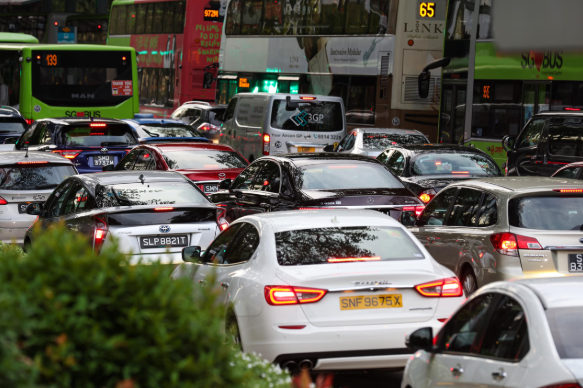Transport Minister highlights potential trade-offs and need for careful study
Singapore is considering the possibility of a one-off increase in its vehicle population, phased over several years, with higher usage-based charges to prevent congestion, Transport Minister Chee Hong Tat stated during the budget debate in Parliament on March 5. However, he emphasized that the trade-offs involved are complex and require careful evaluation before any decision is made.
Member of Parliament Saktiandi Supaat raised the question of whether distance-based charging could enable Singapore to expand its total vehicle population while maintaining its car-lite vision. Minister Chee responded that his ministry is open to reviewing the idea, with potential measures including time- and location-based fees, similar to the current Electronic Road Pricing (ERP) system, or a distance-based charging model.
Balancing Congestion and Affordability
While usage-based fees could help manage congestion, Minister Chee cautioned that relying solely on them is not feasible, as it would require setting rates at extremely high levels, which could be burdensome for many car owners. Additional ownership control measures, such as parking charges, would still be necessary.
Taxi drivers, private-hire vehicle operators, and delivery services—who tend to travel longer distances—could face higher costs under a distance-based charging system. The government will need to assess the impact on these groups to ensure a fair implementation of the policy.
Singapore has already begun rolling out its ERP 2.0 system, which features satellite-based technology capable of supporting distance-based charging. However, the Land Transport Authority (LTA) has stated that there are no immediate plans to replace the current system.
Industry and Expert Opinions
Economist Walter Theseira from the Singapore University of Social Sciences noted that the type of vehicles added and the timing of the increase are critical considerations. He highlighted the growing demand for commercial vehicles and motorcycles due to the rise in e-commerce and deliveries, suggesting that a fleet expansion in these sectors could benefit the economy.
Glenn Tan, president of the Motor Traders Association of Singapore, welcomed the potential move but stressed the need for long-term stability in the Certificate of Entitlement (COE) system. He pointed out that drastic COE price fluctuations, such as those seen in 2023 when premiums hit record highs, create uncertainty for both businesses and consumers.
Automotive consultant Say Kwee Neng argued that controlling vehicle usage through pricing mechanisms is more effective than discouraging car ownership through high costs. He suggested that distance-based charging could be structured to offer incentives, such as lower fees for drivers who limit their mileage or drive in less congested areas.
Future Considerations
The discussion around Singapore’s vehicle population ties into broader concerns about maintaining economic competitiveness. High car prices may deter foreign talent and increase business costs, making Singapore less attractive as a global hub. A more balanced approach to car ownership and usage could help address these challenges while still managing road congestion effectively.
While the government remains open to exploring new approaches, any changes to Singapore’s vehicle policies will require thorough analysis and careful implementation to ensure they align with the country’s long-term urban planning and sustainability goals.








